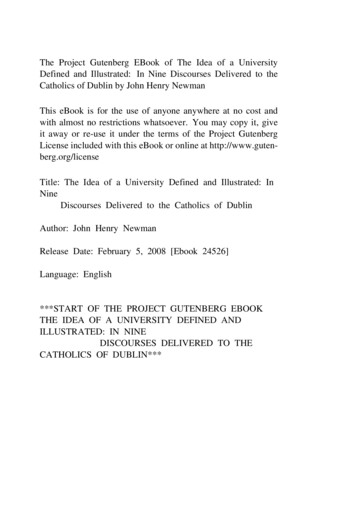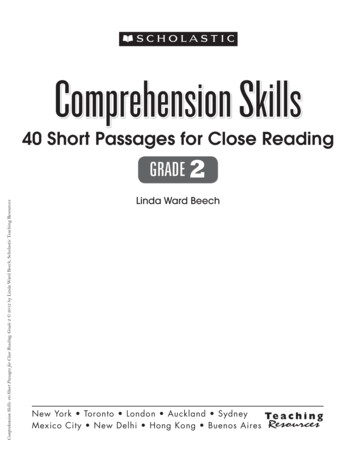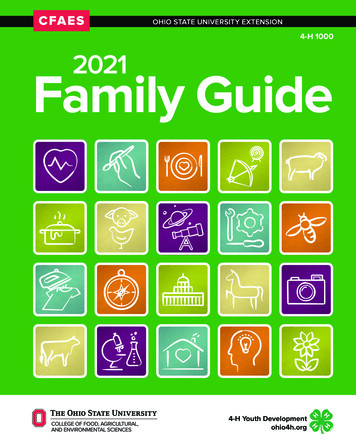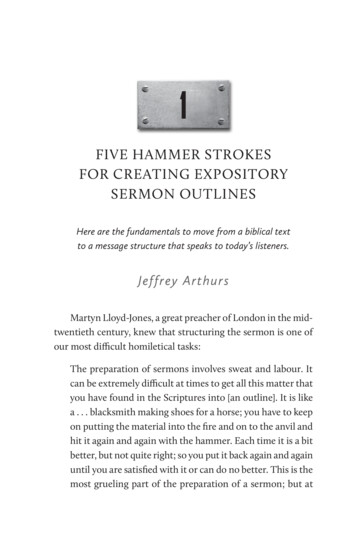
Transcription
The Project Gutenberg EBook of The Idea of a UniversityDefined and Illustrated: In Nine Discourses Delivered to theCatholics of Dublin by John Henry NewmanThis eBook is for the use of anyone anywhere at no cost andwith almost no restrictions whatsoever. You may copy it, giveit away or re-use it under the terms of the Project GutenbergLicense included with this eBook or online at http://www.gutenberg.org/licenseTitle: The Idea of a University Defined and Illustrated: InNineDiscourses Delivered to the Catholics of DublinAuthor: John Henry NewmanRelease Date: February 5, 2008 [Ebook 24526]Language: English***START OF THE PROJECT GUTENBERG EBOOKTHE IDEA OF A UNIVERSITY DEFINED ANDILLUSTRATED: IN NINEDISCOURSES DELIVERED TO THECATHOLICS OF DUBLIN***
The Idea of a University definedand IllustratedIn Nine Discourses Delivered to theCatholics of Dublinby John Henry Newman
ContentsPreface. . . . . . . . . . . . . . . . . . . . . . . . . . . . 3University Teaching. . . . . . . . . . . . . . . . . . . . . 16Introductory. . . . . . . . . . . . . . . . . . . . . . . . 17Theology A Branch Of Knowledge. . . . . . . . . . . 36Bearing Of Theology On Other Branches Of Knowledge. 61Bearing Of Other Branches Of Knowledge On Theology. 91Knowledge Its Own End. . . . . . . . . . . . . . . . . 124Knowledge Viewed In Relation To Learning. . . . . . 150Knowledge Viewed In Relation To Professional Skill. . 179Knowledge Viewed In Relation To Religion. . . . . . . 208Duties Of The Church Towards Knowledge. . . . . . . 242University Subjects, Discussed in Occasional Lectures andEssays. . . . . . . . . . . . . . . . . . . . . . . . . . . 270Introductory Letter. . . . . . . . . . . . . . . . . . . . 271Advertisement. . . . . . . . . . . . . . . . . . . . . . 272Christianity And Letters. A Lecture in the School ofPhilosophy and Letters. . . . . . . . . . . . . . . 273Literature. A Lecture in the School of Philosophy andLetters. . . . . . . . . . . . . . . . . . . . . . . 293English Catholic Literature. . . . . . . . . . . . . . . . 321Elementary Studies. . . . . . . . . . . . . . . . . . . . 360A Form Of Infidelity Of The Day. . . . . . . . . . . . 412University Preaching. . . . . . . . . . . . . . . . . . . 439Christianity and Physical Science. A Lecture in theSchool of Medicine. . . . . . . . . . . . . . . . . 463Christianity And Scientific Investigation. A LectureWritten for the School of Science. . . . . . . . . 492Discipline Of Mind. An Address To The EveningClasses. . . . . . . . . . . . . . . . . . . . . . . 518
ivThe Idea of a University Defined and Illustrated: In Nine Discourses DeliveChristianity And Medical Science.Students Of Medicine. . . .Note on Page 478. . . . . . . . . . . .Index. . . . . . . . . . . . . . . . . .Footnotes . . . . . . . . . . . . . . .An Address to the. . . . . . . . . . . . . . . . . . . . . . . . . . . . . . . . . . . . .545561563577
[vii]
Hospes eram, et collegistis Me.IN GRATEFUL NEVER-DYINGREMEMBRANCEOF HIS MANY FRIENDS ANDBENEFACTORS,LIVING AND DEAD,AT HOME AND ABROADIN GREAT BRITAIN, IRELAND, FRANCE,IN BELGIUM, GERMANY, POLAND, ITALY, ANDMALTA,IN NORTH AMERICA, AND OTHER COUNTRIES,WHO, BY THEIR RESOLUTE PRAYERS AND PENANCE,AND BY THEIR GENEROUS STUBBORN EFFORTSAND BY THEIR MUNIFICENT ALMS,HAVE BROKEN FOR HIM THE STRESSOF A GREAT ANXIETY,THESE DISCOURSES,OFFERED TO OUR LADY AND ST. PHILIP ON ITS RISE,COMPOSED UNDER ITS PRESSURE,FINISHED ON THE EVE OF ITS TERMINATION,ARE RESPECTFULLY AND AFFECTIONATELYINSCRIBEDBY THE AUTHOR.IN FEST. PRÆSENT.B. M. V.NOV. 21, 1852[viii]
Preface.The view taken of a University in these Discourses is the following:—That it is a place of teaching universal knowledge. Thisimplies that its object is, on the one hand, intellectual, not moral;and, on the other, that it is the diffusion and extension of knowledge rather than the advancement. If its object were scientific andphilosophical discovery, I do not see why a University shouldhave students; if religious training, I do not see how it can be theseat of literature and science.Such is a University in its essence, and independently of itsrelation to the Church. But, practically speaking, it cannot fulfilits object duly, such as I have described it, without the Church'sassistance; or, to use the theological term, the Church is necessary for its integrity. Not that its main characters are changed bythis incorporation: it still has the office of intellectual education;but the Church steadies it in the performance of that office.Such are the main principles of the Discourses which follow;though it would be unreasonable for me to expect that I havetreated so large and important a field of thought with the fulnessand precision necessary to secure me from incidental misconceptions of my meaning on the part of the reader. It is true, thereis nothing novel or singular in the argument which I have beenpursuing, but this does not protect me from such misconceptions;for the very circumstance that the views I have been delineatingare not original with me may lead to false notions as to myrelations in opinion towards those from whom I happened in thefirst instance to learn them, and may cause me to be interpretedby the objects or sentiments of schools to which I should besimply opposed.[ix]
4The Idea of a University Defined and Illustrated: In Nine Discourses Deliver[x]For instance, some persons may be tempted to complain, thatI have servilely followed the English idea of a University, to thedisparagement of that Knowledge which I profess to be so strenuously upholding; and they may anticipate that an academicalsystem, formed upon my model, will result in nothing better orhigher than in the production of that antiquated variety of humannature and remnant of feudalism, as they consider it, called“a gentleman.”1 Now, I have anticipated this charge in variousparts of my discussion; if, however, any Catholic is found toprefer it (and to Catholics of course this Volume is primarilyaddressed), I would have him first of all ask himself the previousquestion, what he conceives to be the reason contemplated by theHoly See in recommending just now to the Irish Hierarchy theestablishment of a Catholic University? Has the Supreme Pontiffrecommended it for the sake of the Sciences, which are to be thematter, and not rather of the Students, who are to be the subjects,of its teaching? Has he any obligation or duty at all towardssecular knowledge as such? Would it become his ApostolicalMinistry, and his descent from the Fisherman, to have a zeal forthe Baconian or other philosophy of man for its own sake? Isthe Vicar of Christ bound by office or by vow to be the preacherof the theory of gravitation, or a martyr for electro-magnetism?Would he be acquitting himself of the dispensation committedto him if he were smitten with an abstract love of these matters,however true, or beautiful, or ingenious, or useful? Or rather,does he not contemplate such achievements of the intellect, asfar as he contemplates them, solely and simply in their relationto the interests of Revealed Truth? Surely, what he does hedoes for the sake of Religion; if he looks with satisfaction onstrong temporal governments, which promise perpetuity, it is forthe sake of Religion; and if he encourages and patronizes artand science, it is for the sake of Religion. He rejoices in the1Vid. Huber's English Universities, London, 1843, vol. ii., part 1, pp. 321,etc.
Preface.5widest and most philosophical systems of intellectual education,from an intimate conviction that Truth is his real ally, as it is hisprofession; and that Knowledge and Reason are sure ministers toFaith.This being undeniable, it is plain that, when he suggests tothe Irish Hierarchy the establishment of a University, his firstand chief and direct object is, not science, art, professional skill,literature, the discovery of knowledge, but some benefit or other,to accrue, by means of literature and science, to his own children;not indeed their formation on any narrow or fantastic type, as,for instance, that of an “English Gentleman” may be called, buttheir exercise and growth in certain habits, moral or intellectual.Nothing short of this can be his aim, if, as becomes the Successor of the Apostles, he is to be able to say with St. Paul,“Non judicavi me scire aliquid inter vos, nisi Jesum Christum,et hunc crucifixum.” Just as a commander wishes to have talland well-formed and vigorous soldiers, not from any abstractdevotion to the military standard of height or age, but for thepurposes of war, and no one thinks it any thing but natural andpraiseworthy in him to be contemplating, not abstract qualities,but his own living and breathing men; so, in like manner, whenthe Church founds a University, she is not cherishing talent,genius, or knowledge, for their own sake, but for the sake of herchildren, with a view to their spiritual welfare and their religiousinfluence and usefulness, with the object of training them to filltheir respective posts in life better, and of making them moreintelligent, capable, active members of society.Nor can it justly be said that in thus acting she sacrificesScience, and, under a pretence of fulfilling the duties of hermission, perverts a University to ends not its own, as soon as it istaken into account that there are other institutions far more suitedto act as instruments of stimulating philosophical inquiry, andextending the boundaries of our knowledge, than a University.Such, for instance, are the literary and scientific “Academies,”[xi]
6The Idea of a University Defined and Illustrated: In Nine Discourses Deliver[xii]which are so celebrated in Italy and France, and which havefrequently been connected with Universities, as committees, or,as it were, congregations or delegacies subordinate to them.Thus the present Royal Society originated in Charles the Second's time, in Oxford; such just now are the Ashmolean andArchitectural Societies in the same seat of learning, which haverisen in our own time. Such, too, is the British Association, amigratory body, which at least at times is found in the halls of theProtestant Universities of the United Kingdom, and the faults ofwhich lie, not in its exclusive devotion to science, but in gravermatters which it is irrelevant here to enter upon. Such again isthe Antiquarian Society, the Royal Academy for the Fine Arts,and others which might be mentioned. This, then, is the sort ofinstitution, which primarily contemplates Science itself, and notstudents; and, in thus speaking, I am saying nothing of my own,being supported by no less an authority than Cardinal Gerdil.“Ce n'est pas,” he says, “qu'il y ait aucune véritable oppositionentre l'esprit des Académies et celui des Universités; ce sontseulement des vues differentes. Les Universités sont établiespour enseigner les sciences aux élèves qui veulent s'y former;les Académies se proposent de nouvelles recherches à faire dansla carriàre des sciences. Les Universités d'Italie ont fourni dessujets qui ont fait honneur aux Académies; et celles-ci ont donnéaux Universités des Professeurs, qui ont rempli les chaires avecla plus grande distinction.”2The nature of the case and the history of philosophy combineto recommend to us this division of intellectual labour betweenAcademies and Universities. To discover and to teach are distinct functions; they are also distinct gifts, and are not commonlyfound united in the same person. He, too, who spends his dayin dispensing his existing knowledge to all comers is unlikelyto have either leisure or energy to acquire new. The common2Opere, t. iii., p. 353.
Preface.7sense of mankind has associated the search after truth with seclusion and quiet. The greatest thinkers have been too intent ontheir subject to admit of interruption; they have been men ofabsent minds and idosyncratic habits, and have, more or less,shunned the lecture room and the public school. Pythagoras,the light of Magna Græcia, lived for a time in a cave. Thales,the light of Ionia, lived unmarried and in private, and refusedthe invitations of princes. Plato withdrew from Athens to thegroves of Academus. Aristotle gave twenty years to a studiousdiscipleship under him. Friar Bacon lived in his tower upon theIsis. Newton indulged in an intense severity of meditation whichalmost shook his reason. The great discoveries in chemistryand electricity were not made in Universities. Observatories aremore frequently out of Universities than in them, and even whenwithin their bounds need have no moral connexion with them.Porson had no classes; Elmsley lived a good part of his life in thecountry. I do not say that there are not great examples the otherway, perhaps Socrates, certainly Lord Bacon; still I think it mustbe allowed on the whole that, while teaching involves externalengagements, the natural home for experiment and speculationis retirement.Returning, then, to the consideration of the question, fromwhich I may seem to have digressed, thus much I think I havemade good,—that, whether or no a Catholic University shouldput before it, as its great object, to make its students “gentlemen,” still to make them something or other is its great object,and not simply to protect the interests and advance the dominionof Science. If, then, this may be taken for granted, as I thinkit may, the only point which remains to be settled is, whether Ihave formed a probable conception of the sort of benefit whichthe Holy See has intended to confer on Catholics who speakthe English tongue by recommending to the Irish Hierarchy theestablishment of a University; and this I now proceed to consider.Here, then, it is natural to ask those who are interested in[xiii]
8The Idea of a University Defined and Illustrated: In Nine Discourses Deliver[xiv]the question, whether any better interpretation of the recommendation of the Holy See can be given than that which I havesuggested in this Volume. Certainly it does not seem to me rashto pronounce that, whereas Protestants have great advantagesof education in the Schools, Colleges, and Universities of theUnited Kingdom, our ecclesiastical rulers have it in purpose thatCatholics should enjoy the like advantages, whatever they are,to the full. I conceive they view it as prejudicial to the interests ofReligion that there should be any cultivation of mind bestowedupon Protestants which is not given to their own youth also. Asthey wish their schools for the poorer and middle classes to beat least on a par with those of Protestants, they contemplate thesame object also as regards that higher education which is givento comparatively the few. Protestant youths, who can spare thetime, continue their studies till the age of twenty-one or twentytwo; thus they employ a time of life all-important and especiallyfavourable to mental culture. I conceive that our Prelates areimpressed with the fact and its consequences, that a youth whoends his education at seventeen is no match (cæteris paribus) forone who ends it at twenty-two.All classes indeed of the community are impressed with a factso obvious as this. The consequence is, that Catholics who aspireto be on a level with Protestants in discipline and refinementof intellect have recourse to Protestant Universities to obtainwhat they cannot find at home. Assuming (as the Rescriptsfrom Propaganda allow me to do) that Protestant education isinexpedient for our youth,—we see here an additional reasonwhy those advantages, whatever they are, which Protestant communities dispense through the medium of Protestantism shouldbe accessible to Catholics in a Catholic form.What are these advantages? I repeat, they are in one wordthe culture of the intellect. Robbed, oppressed, and thrust aside,Catholics in these islands have not been in a condition for centuries to attempt the sort of education which is necessary for the
Preface.9man of the world, the statesman, the landholder, or the opulentgentleman. Their legitimate stations, duties, employments, havebeen taken from them, and the qualifications withal, social andintellectual, which are necessary both for reversing the forfeitureand for availing themselves of the reversal. The time is comewhen this moral disability must be removed. Our desideratumis, not the manners and habits of gentlemen;—these can be,and are, acquired in various other ways, by good society, byforeign travel, by the innate grace and dignity of the Catholicmind;—but the force, the steadiness, the comprehensiveness andthe versatility of intellect, the command over our own powers,the instinctive just estimate of things as they pass before us,which sometimes indeed is a natural gift, but commonly is notgained without much effort and the exercise of years.This is real cultivation of mind; and I do not deny that thecharacteristic excellences of a gentleman are included in it. Norneed we be ashamed that they should be, since the poet long agowrote, that “Ingenuas didicisse fideliter artes Emollit mores.”Certainly a liberal education does manifest itself in a courtesy,propriety, and polish of word and action, which is beautiful initself, and acceptable to others; but it does much more. It bringsthe mind into form,—for the mind is like the body. Boys outgrowtheir shape and their strength; their limbs have to be knit together,and their constitution needs tone. Mistaking animal spirits forvigour, and over-confident in their health, ignorant what they canbear and how to manage themselves, they are immoderate andextravagant; and fall into sharp sicknesses. This is an emblemof their minds; at first they have no principles laid down withinthem as a foundation for the intellect to build upon: they have nodiscriminating convictions, and no grasp of consequences. Andtherefore they talk at random, if they talk much, and cannot helpbeing flippant, or what is emphatically called “young.” They aremerely dazzled by phenomena, instead of perceiving things asthey are.[xv][xvi]
10The Idea of a University Defined and Illustrated: In Nine Discourses DeliveIt were well if none remained boys all their lives; but what ismore common than the sight of grown men, talking on politicalor moral or religious subjects, in that offhand, idle way, whichwe signify by the word unreal? “That they simply do not knowwhat they are talking about” is the spontaneous silent remark ofany man of sense who hears them. Hence such persons have nodifficulty in contradicting themselves in successive sentences,without being conscious of it. Hence others, whose defect inintellectual training is more latent, have their most unfortunatecrotchets, as they are called, or hobbies, which deprive themof the influence which their estimable qualities would otherwisesecure. Hence others can never look straight before them, neversee the point, and have no difficulties in the most difficult subjects. Others are hopelessly obstinate and prejudiced, and, afterthey have been driven from their opinions, return to them thenext moment without even an attempt to explain why. Others areso intemperate and intractable that there is no greater calamityfor a good cause than that they should get hold of it. It is veryplain from the very particulars I have mentioned that, in thisdelineation of intellectual infirmities, I am drawing, not fromCatholics, but from the world at large; I am referring to anevil which is forced upon us in every railway carriage, in everycoffee-room or table-d'hæte, in every mixed company, an evil,however, to which Catholics are not less exposed than the rest ofmankind.[xvii]When the intellect has once been properly trained and formedto have a connected view or grasp of things, it will display itspowers with more or less effect according to its particular qualityand capacity in the individual. In the case of most men it makesitself felt in the good sense, sobriety of thought, reasonableness,candour, self-command, and steadiness of view, which characterize it. In some it will have developed habits of business, powerof influencing others, and sagacity. In others it will elicit thetalent of philosophical speculation, and lead the mind forward to
Preface.11eminence in this or that intellectual department. In all it will bea faculty of entering with comparative ease into any subject ofthought, and of taking up with aptitude any science or profession. All this it will be and will do in a measure, even when themental formation be made after a model but partially true; for, asfar as effectiveness goes, even false views of things have moreinfluence and inspire more respect than no views at all. Men whofancy they see what is not are more energetic, and make theirway better, than those who see nothing; and so the undoubtinginfidel, the fanatic, the heresiarch, are able to do much, whilethe mere hereditary Christian, who has never realized the truthswhich he holds, is unable to do any thing. But, if consistency ofview can add so much strength even to error, what may it not beexpected to furnish to the dignity, the energy, and the influenceof Truth!Some one, however, will perhaps object that I am but advocating that spurious philosophism, which shows itself in what, forwant of a word, I may call “viewiness,” when I speak so much ofthe formation, and consequent grasp, of the intellect. It may besaid that the theory of University Education, which I have beendelineating, if acted upon, would teach youths nothing soundlyor thoroughly, and would dismiss them with nothing better thanbrilliant general views about all things whatever.This indeed, if well founded, would be a most serious objection to what I have advanced in this Volume, and woulddemand my immediate attention, had I any reason to think thatI could not remove it at once, by a simple explanation of whatI consider the true mode of educating, were this the place to doso. But these Discourses are directed simply to the considerationof the aims and principles of Education. Suffice it, then, to sayhere, that I hold very strongly that the first step in intellectualtraining is to impress upon a boy's mind the idea of science,method, order, principle, and system; of rule and exception, ofrichness and harmony. This is commonly and excellently done[xviii]
12The Idea of a University Defined and Illustrated: In Nine Discourses Delive[xix]by making him begin with Grammar; nor can too great accuracy,or minuteness and subtlety of teaching be used towards him, ashis faculties expand, with this simple purpose. Hence it is thatcritical scholarship is so important a discipline for him whenhe is leaving school for the University. A second science isthe Mathematics: this should follow Grammar, still with thesame object, viz., to give him a conception of development andarrangement from and around a common centre. Hence it is thatChronology and Geography are so necessary for him, when hereads History, which is otherwise little better than a story-book.Hence, too, Metrical Composition, when he reads Poetry; inorder to stimulate his powers into action in every practicableway, and to prevent a merely passive reception of images andideas which in that case are likely to pass out of the mind as soonas they have entered it. Let him once gain this habit of method, ofstarting from fixed points, of making his ground good as he goes,of distinguishing what he knows from what he does not know,and I conceive he will be gradually initiated into the largest andtruest philosophical views, and will feel nothing but impatienceand disgust at the random theories and imposing sophistries anddashing paradoxes, which carry away half-formed and superficialintellects.Such parti-coloured ingenuities are indeed one of the chiefevils of the day, and men of real talent are not slow to minister tothem. An intellectual man, as the world now conceives of him,is one who is full of “views” on all subjects of philosophy, on allmatters of the day. It is almost thought a disgrace not to have aview at a moment's notice on any question from the Personal Advent to the Cholera or Mesmerism. This is owing in great measureto the necessities of periodical literature, now so much in request.Every quarter of a year, every month, every day, there must be asupply, for the gratification of the public, of new and luminoustheories on the subjects of religion, foreign politics, home politics, civil economy, finance, trade, agriculture, emigration, and
Preface.13the colonies. Slavery, the gold fields, German philosophy, theFrench Empire, Wellington, Peel, Ireland, must all be practisedon, day after day, by what are called original thinkers. As thegreat man's guest must produce his good stories or songs at theevening banquet, as the platform orator exhibits his telling factsat mid-day, so the journalist lies under the stern obligation ofextemporizing his lucid views, leading ideas, and nutshell truthsfor the breakfast table. The very nature of periodical literature,broken into small wholes, and demanded punctually to an hour,involves the habit of this extempore philosophy. “Almost all theRamblers,” says Boswell of Johnson, “were written just as theywere wanted for the press; he sent a certain portion of the copyof an essay, and wrote the remainder while the former part ofit was printing.” Few men have the gifts of Johnson, who togreat vigour and resource of intellect, when it was fairly roused,united a rare common-sense and a conscientious regard for veracity, which preserved him from flippancy or extravagance inwriting. Few men are Johnsons; yet how many men at this dayare assailed by incessant demands on their mental powers, whichonly a productiveness like his could suitably supply! There isa demand for a reckless originality of thought, and a sparklingplausibility of argument, which he would have despised, even ifhe could have displayed; a demand for crude theory and unsoundphilosophy, rather than none at all. It is a sort of repetition ofthe “Quid novi?” of the Areopagus, and it must have an answer.Men must be found who can treat, where it is necessary, like theAthenian sophist, de omni scibili,“Grammaticus, Rhetor, Geometres, Pictor, Aliptes,Augur, Schœnobates, Medicus, Magus, omnia novit.”I am speaking of such writers with a feeling of real sympathyfor men who are under the rod of a cruel slavery. I have neverindeed been in such circumstances myself, nor in the temptationswhich they involve; but most men who have had to do with[xx]
14The Idea of a University Defined and Illustrated: In Nine Discourses Delive[xxi]composition must know the distress which at times it occasionsthem to have to write—a distress sometimes so keen and sospecific that it resembles nothing else than bodily pain. Thatpain is the token of the wear and tear of mind; and, if worksdone comparatively at leisure involve such mental fatigue andexhaustion, what must be the toil of those whose intellects areto be flaunted daily before the public in full dress, and thatdress ever new and varied, and spun, like the silkworm's, out ofthemselves! Still whatever true sympathy we may feel for theministers of this dearly purchased luxury, and whatever sense wemay have of the great intellectual power which the literature inquestion displays, we cannot honestly close our eyes to its directevil.One other remark suggests itself, which is the last I shall thinkit necessary to make. The authority, which in former times waslodged in Universities, now resides in very great measure in thatliterary world, as it is called, to which I have been referring.This is not satisfactory, if, as no one can deny, its teaching be sooffhand, so ambitious, so changeable. It increases the seriousnessof the mischief, that so very large a portion of its writers areanonymous, for irresponsible power never can be any thing buta great evil; and, moreover, that, even when they are known,they can give no better guarantee for the philosophical truth oftheir principles than their popularity at the moment, and theirhappy conformity in ethical character to the age which admiresthem. Protestants, however, may do as they will: it is a matter fortheir own consideration; but at least it concerns us that our ownliterary tribunals and oracles of moral duty should bear a gravercharacter. At least it is a matter of deep solicitude to CatholicPrelates that their people should be taught a wisdom, safe fromthe excesses and vagaries of individuals, embodied in institutionswhich have stood the trial and received the sanction of ages, andadministered by men who have no need to be anonymous, asbeing supported by their consistency with their predecessors and
Preface.15with each other.November 21. 1852.[xxii]
University Teaching.[001]
Discourse I.Introductory.
1.[002]In addressing myself, Gentlemen, to the consideration of a question which has excited so much interest, and elicited so muchdiscussion at the present day, as that of University Education, Ifeel some explanation is due from me for supposing, after suchhigh ability and wide experience have been brought to bear uponit, that any field remains for the additional labours either of adisputant or of an inquirer. If, nevertheless, I still venture to askpermission to continue the discussion, already so protracted, it isbecause the subject of Liberal Education, and of the principleson which it must be conducted, has ever had a hold upon myown mind; and because I have lived the greater part of my lifein a place which has all that time been occupied in a series ofcontroversies both domestic and with strangers, and of measures,experimental or definitive, bearing upon it. About fifty yearssince, the English University, of which I was so long a member,after a century of inactivity, at length was roused, at a time when(as I may say) it was giving no education at all to the youthcommitted to its keeping, to a sense of the responsibilities whichits profession and its station involved, and it presents to us thes
shunned the lecture room and the public school. Pythagoras, the light of Magna Græcia, lived for a time in a cave. Thales, the light of Ionia, lived unmarried and in private, and refused the invitations of princes. Plato withdrew from Athens to the groves of Academus. Aristotle gave twenty years to a studious discipleship under him.











